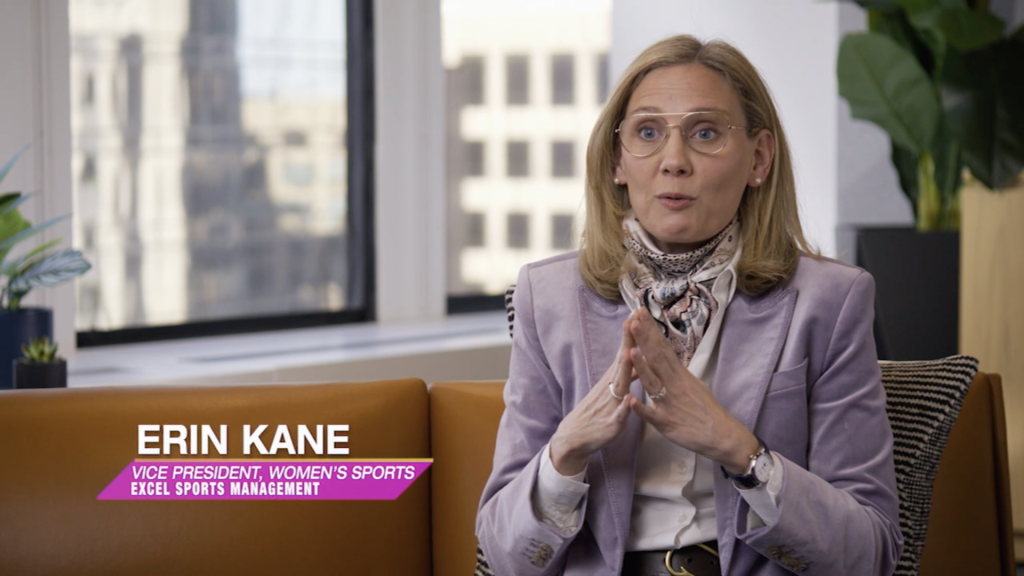Since her arrival in the pros, Indiana Fever star Caitlin Clark has driven immense growth for the WNBA. Now, her agent is ready for the league to respond.
In an interview with ESPN, Excel vice president of women’s sports Erin Kane argued that it is not “possible” for Clark to ever be paid what she’s worth to the WNBA. But after a record new broadcast rights deal and with collective bargaining agreement negotiations looming between the league and its players, Kane has one idea for how the league could get closer to properly paying its players.
“I think we’re ready for a spin-off [from the NBA],” Kane told ESPN’s Michele Steele. “I just think that the NBA is incentivized to make decisions that are good for the NBA, and those are not always aligned with what’s good for the WNBA.”
A good example of that might be the media rights deal. After the initial shock of seeing the WNBA quadruple its broadcast revenue wore off, the backlash began quickly. Everyone from Hall of Famer Cheryl Miller to WNBPA executive director Terri Jackson argued the league was actually undervalued.
For anyone following the negotiations closely, that wasn’t a hard case to make. From the start, the WNBA’s choice to bind itself to the NBA once again was a risk. After all, it was former ESPN president John Skipper (who helped negotiate a massive first deal between Unrivaled and TNT last year) who clarified that the women’s league was effectively a throw-in when he negotiated media rights deals with the NBA. And although it will help the WNBA to add new partners beyond ESPN and maintain its freedom to sell off other packages, the league’s top partners are locked in for the next 11 years.
Hope may be on the horizon on the media side. Ben Strauss of the Washington Post reported last year that this package is expected to be the final one in which the WNBA is tethered to the NBA.
But now is the time to think bigger. The players’ association last November formally opted out of the CBA, which will now expire at the end of the 2025 season. Until then, the WNBA and its players will engage in the most high-stakes negotiations since the league’s inception in 1996.
Before they get to the big-picture of who is calling the shots in the league office, the basics of dividing money will come first. Perhaps the most astounding example that supports Kane’s position that W players would be better off away from its current parent league is that throughout the league’s history, players have received just 10 percent of “basketball-related income.” Given the soaring popularity of the WNBA and its stars, it would be a disastrous own goal for them to let this continue.
An agent’s job is to apply pressure. Kane may not see the WNBA cutting ties from the NBA as a realistic goal for the players in the 2026 CBA, but the conversation has to start somewhere.
And like Miller or Jackson or various others in the months since the WNBA agreed on its new broadcast contracts, Kane is staking claim to the position that the best way for players to be properly compensated is for the league to operate independently of the NBA. With 11 years to go on the broadcast deal and a good portion of that frame likely to be aligned with the new CBA, it’s clear the league’s relationship to its owners at the NBA will be a prominent talking point in the coming years.

 awfulannouncing.com
awfulannouncing.com
In an interview with ESPN, Excel vice president of women’s sports Erin Kane argued that it is not “possible” for Clark to ever be paid what she’s worth to the WNBA. But after a record new broadcast rights deal and with collective bargaining agreement negotiations looming between the league and its players, Kane has one idea for how the league could get closer to properly paying its players.
“I think we’re ready for a spin-off [from the NBA],” Kane told ESPN’s Michele Steele. “I just think that the NBA is incentivized to make decisions that are good for the NBA, and those are not always aligned with what’s good for the WNBA.”
A good example of that might be the media rights deal. After the initial shock of seeing the WNBA quadruple its broadcast revenue wore off, the backlash began quickly. Everyone from Hall of Famer Cheryl Miller to WNBPA executive director Terri Jackson argued the league was actually undervalued.
For anyone following the negotiations closely, that wasn’t a hard case to make. From the start, the WNBA’s choice to bind itself to the NBA once again was a risk. After all, it was former ESPN president John Skipper (who helped negotiate a massive first deal between Unrivaled and TNT last year) who clarified that the women’s league was effectively a throw-in when he negotiated media rights deals with the NBA. And although it will help the WNBA to add new partners beyond ESPN and maintain its freedom to sell off other packages, the league’s top partners are locked in for the next 11 years.
Hope may be on the horizon on the media side. Ben Strauss of the Washington Post reported last year that this package is expected to be the final one in which the WNBA is tethered to the NBA.
But now is the time to think bigger. The players’ association last November formally opted out of the CBA, which will now expire at the end of the 2025 season. Until then, the WNBA and its players will engage in the most high-stakes negotiations since the league’s inception in 1996.
Before they get to the big-picture of who is calling the shots in the league office, the basics of dividing money will come first. Perhaps the most astounding example that supports Kane’s position that W players would be better off away from its current parent league is that throughout the league’s history, players have received just 10 percent of “basketball-related income.” Given the soaring popularity of the WNBA and its stars, it would be a disastrous own goal for them to let this continue.
An agent’s job is to apply pressure. Kane may not see the WNBA cutting ties from the NBA as a realistic goal for the players in the 2026 CBA, but the conversation has to start somewhere.
And like Miller or Jackson or various others in the months since the WNBA agreed on its new broadcast contracts, Kane is staking claim to the position that the best way for players to be properly compensated is for the league to operate independently of the NBA. With 11 years to go on the broadcast deal and a good portion of that frame likely to be aligned with the new CBA, it’s clear the league’s relationship to its owners at the NBA will be a prominent talking point in the coming years.

Caitlin Clark's agent calls for WNBA to 'spin-off' from NBA
Caitlin Clark's agent Erin Kane of Excel argued in a new interview with ESPN that now's the time for the WNBA to split from the NBA for good.
 awfulannouncing.com
awfulannouncing.com






 Yeah OK
Yeah OK “
“